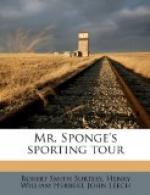Mr. Puffington still stuck to the ‘am_aa_zin’ pop’lar man’ character; a character that is not so convenient to support in the country as it is in town. The borough of Swillingford, as we have already intimated, was not the best conducted borough in the world; indeed, when we say that the principal trade of the place was poaching, our country readers will be able to form a very accurate opinion on that head. When Puff took possession of Hanby there was a fair show of pheasants about the house, and a good sprinkling of hares and partridges over the estate and manor generally; but refusing to prosecute the first poachers that were caught, the rest took the hint, and cleared everything off in a week, dividing the plunder among them. They also burnt his river and bagged his fine Dorking fowls, and all these feats being accomplished with impunity, they turned their attention to his fat sheep.
‘Poacher’ is only a mild term for ‘thief.’
Puff was a perfect milch-cow in the way of generosity. He gave to everything and everybody, and did not seem to be acquainted with any smaller sum than a five-pound note; a five-pound note to replace Giles Jolter’s cart-horse (that used to carry his own game for the poachers to the poulterers at Plunderstone)—five pounds to buy Dame Doubletongue another pig, though she had only just given three pounds for the one that died—five pounds towards the fire at farmer Scratchley’s, though it had taken place two years before Puff came into the country, and Scratchley had been living upon it ever since—and sundry other five pounds to other equally deserving and amiable people. He put his name down for fifty to the Mangeysterne hounds without ever being asked; which reminds us that we ought to be directing our attention to that noble establishment.
It is hard to have to go behind the scenes of an ill-supported hunt, and we will be as brief and tender with the cripples as we can. The Mangeysterne hounds wanted that great ingredient of prosperity, a large nest-egg subscriber, to whom all others could be tributary—paying or not as might be convenient. The consequence was they were always up the spout. They were neither a scratch pack nor a regular pack, but something betwixt and between. They were hunted by a saddler, who found his own horses, and sometimes he had a whip and sometimes he hadn’t. The establishment died as often as old Mantalini himself. Every season that came to a close was proclaimed to be their last, but somehow or other they always managed to scramble into existence on the approach of another. It is a way, indeed, that delicate packs have of recruiting their finances. Nevertheless, the Mangeysternes did look very like coming to an end about the time that Mr. Puffington bought Hanby House. The saddler huntsman had failed; John Doe had taken one of his screws, and Richard Roe the other, and anybody might have the hounds that liked: Puffington then turned up.




